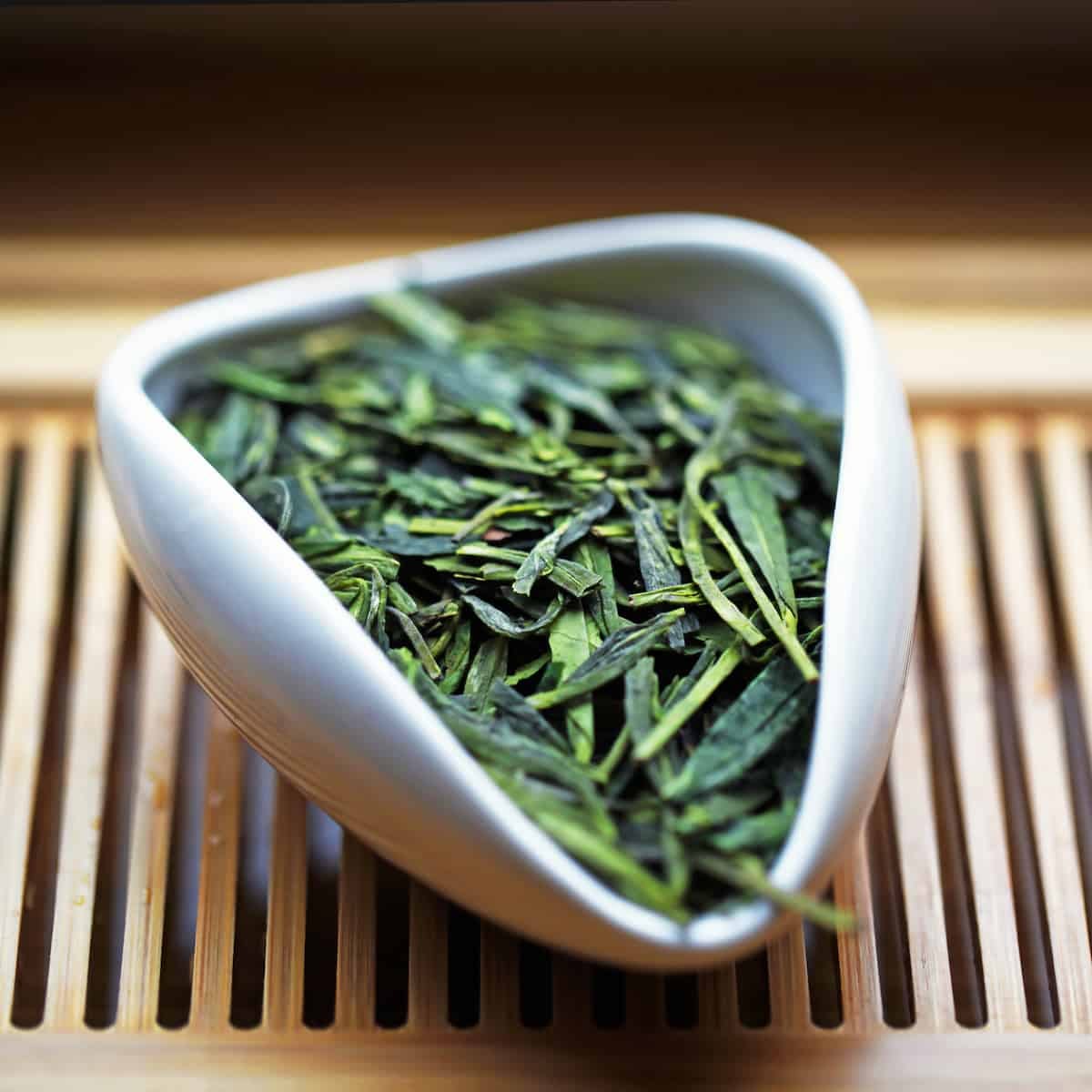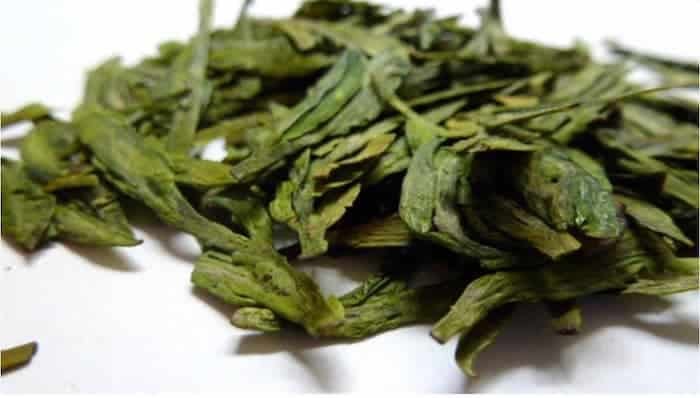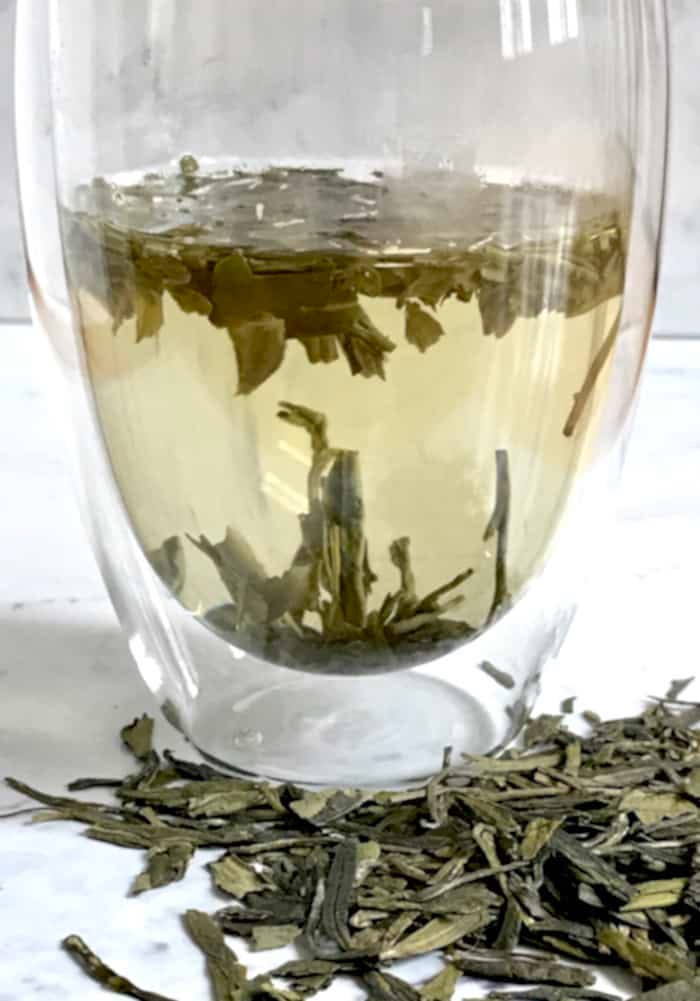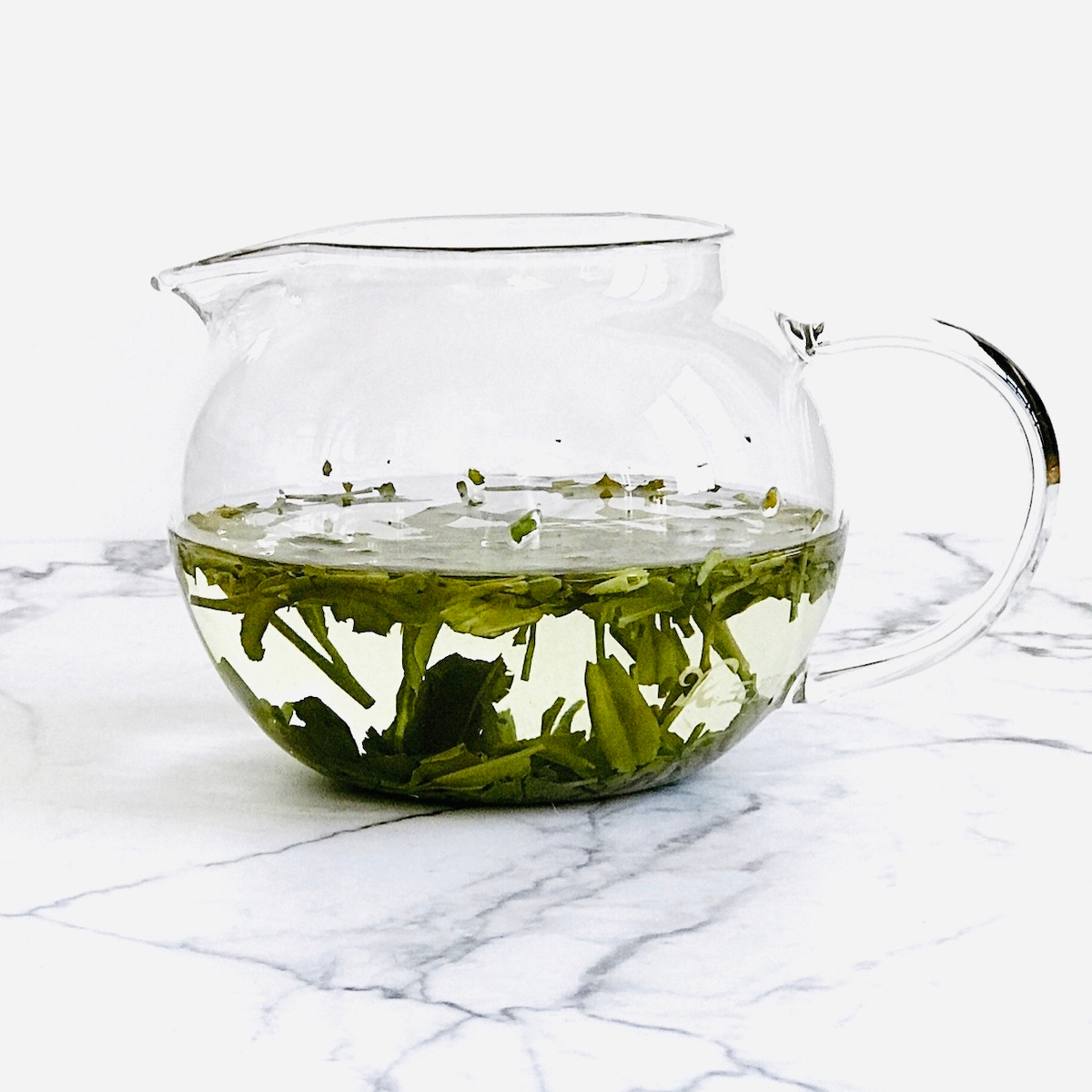Dragon Well or Longjing Chinese Green Tea and Longevity
Drinking tea daily has many benefits that can lead to healthy longevity.
Modern medicine can stitch us back together but rarely reaches the deep roots. That’s why I turn to nature’s quiet wisdom for long-term, lasting health. Truthfully, healing isn’t found in a pill—it’s woven into our daily rituals. It’s how we nourish our bodies and seek peace in the chaos.
For me, that sanctuary is tea—a simple ritual—steeping leaves into a soothing tonic that restores body and soul. Dragon Well Green Tea stands out among the many treasures of tea, offering a delicate yet powerful promise of vitality.
Dragon Well Green Tea
There's no mistaking this tea's buttery yellow liquor. With its flattened, spear-like leaves, Dragon Well (Long Jing) Chinese green tea opens up to reveal two leaves when brewed. Dragon Well is one of China's best and most well-known teas. It tastes a little like toasted nuts, with some vegetal notes of a subtle classic green tea taste.
If you don't like green tea, you haven't tried Dragon Well tea. It's a beautiful tea from the Camellia sinensis plant that will transform your love for green tea.
Dragon Well tea is the most famous Chinese green tea. Long Jing Dragon Well, or Lung Ching, is the Chinese name for the unique shape of this green flat-leaf tea. Discover why this Dragon tea is so well loved.
Common Names: Dragon Well, Long Jing, Longjing tea, Lung Ching (Chinese Dragon Tea)
Profile: This pale yellow liquor is soft, rich, and toasty, with a chestnut aroma and vegetal sweetness.
Region: Hangzhou in the West Lake region of Zhejiang province of eastern China.
Dry leaf: Flat leaf or bird's peak bud sets, smooth and slick to the touch.
Origins of Dragon Well Tea
Dragon Well is one of China's ten most famous green teas. It is pan-baked over hot woks, flattening the leaves during heating. Longjing, which translates as dragon well, must be authentic to the Chinese Province of Zhejiang. Much like champagne, if it is grown anywhere else, it is not genuine.
Long Jing is a spring tea picked in early April, following Qing Ming, the traditional Chinese holiday for paying respects to ancestors. The Qingming festival falls fifteen days after the Spring Equinox, usually the first week in April.
Chinese tea culture divides fresh green tea by their picking dates. Any tea picked before this date is costly and is a rare tea called Pre Qing Ming. Pre-Qing Ming tea is also called Imperial Long Jing and is one of the most celebrated teas because the early spring teas have the most flavor after a long winter's rest.
How To Brew Dragon Well Green Tea
Traditional methods use 6 grams of tea leaves for a 30-ounce teapot, about 4 grams for a 16-ounce cup, and 2 grams for an 8-ounce cup. The leaves require hot water at a lower temperature of 185 °F (85°C).
Brewing is recommended in a small teapot, clear insulated glass, or gaiwan.
Pour heated, filtered water over tea leaves in a circular motion so the heat is even. High-quality loose tea leaves can be reused multiple times.
Steeping Time: The first infusion takes 2-3 minutes, and the second takes 3- 5 minutes. Subsequent infusions can be longer, depending on how strong you like your tea.
Always pour water slowly and in a circle on high-end green tea. You can see the leaves start to drop after about 2 minutes. The liquor becomes pale, fresh green.
If you want to strengthen it, wait until the color is richer. If your pot has a filter, you can remove it when your tea is strong enough.
If you prepare it in a cup or glass, you can drink straight from the cup without removing the tea leaves once they settle to the bottom. Higher-quality green tea will never go bitter.
After two minutes, you can drink straight from your cup when all the leaves sink to the bottom.
Leave about one-fifth of your tea in your cup or pot before making your next infusion. You can reuse the same serving of tea leaves at least three to four times.
I like brewing in my clear, insulated glass cup. It allows me to see the beauty of the leaves and the color of the liquor while I brew. The glass steeper removes the brewed leaves and easily holds the lid.
What Does Dragon Well Tea Taste Like?
Dragon Well is an excellent tea with a fresh, snap-pea, and slightly chestnut fragrance that appeals to most tea drinkers. Its toasty, smooth flavor has delicate nutty notes. When brewed correctly, it's never astringent or bitter. The lightly roasted, subtle flavor reminds me of a little meadow.
Authentic Dragon Well tea has a signature chestnut aroma - an easy way to authenticate legitimate Long Jing tea. It stands up to multiple brews and does better with short brew times. It's one of my favorite green teas.
Dragon Well is not like Japanese Green teas, which I also enjoy. Japanese green teas have a much more spinachy, vegetal taste because they are steamed instead of roasted, drastically changing the flavor.
READ
14 Green Teas You Can Actually Like
Green tea is not the darling of America’s tea culture. Most Western tea drinkers prefer black tea, a shift rooted in the history of the Boston Tea Party and the American Revolution. Before the Revolution, colonists favored green tea, but the rebellion transformed their tea habits, switchi…
Dragon Well Tea Tips
Long before our beloved tea was a beverage, it was used as a medicine and a culinary flavoring.
Cooking Tip:
Did you know you can baste your roast with leftover tea?
Dragon Well is perfect with roasted chicken. Add the tea to the pan at the beginning of the cooking time. Baste the roast with the tea and mix it with the cooking juices. It couldn't be easier.
Culinary Pairing:
Dragon Well has a nutty quality with slight astringency and pairs well with many kinds of cheese, such as Camembert or Brie. You might try pairing it with Gruyere, one of my favorite cheeses. It's lovely.
Dragon Well also pairs nicely with fruits, custards, and seafood. To learn more about tea and food, you might want to read Culinary Tea by Cynthia Gold. If you love tea and love cooking, this book is a must-have.
Dragon Well Tea Benefits
All teas have benefits from hundreds of biologically active chemicals, including flavonoids. Green teas are especially rich in flavonoids called flavan-3-ol monomers or catechins. Black teas contain more complex chemicals—theaflavins and thearubigins—derived from catechins.
Dragon Well contains a significant amount of catechins, particularly epigallocatechin gallate (EGCG), which is linked to many health benefits.
Scientific research supports the role of tea in improving health, and the Linus Pauling Institute Micronutrient Information Center at Oregon State University has put together a comprehensive overview. Another excellent presentation on the health benefits of tea was given at the Fifth International Scientific Symposium on Tea and Human Health, and the studies were published in the American Journal of Clinical Nutrition.
Some of the findings report:
In 2014, an analysis of 13 studies indicated that green tea consumption significantly lowers blood pressure. 1
Tea may improve blood vessel function, lower blood pressure, and reduce stroke, heart attack, and other cardiovascular diseases by 10%.
Drinking tea may help mitigate the harmful effects of high-fat meals on blood vessel function. The Journal of Food Science showed that green tea polyphenols could negate a high-fat diet's damaging effects on your intestinal (gut) flora. 2
Drinking several cups of green tea daily may help burn 100 calories. The same study suggests that green tea may support obesity and metabolic disorders associated with high-fat diets.
Tea has anticancer properties: Men drinking more than 1.5 cups of green tea daily had a 70% lower colon cancer risk.
Tea consumption reduces mortality and increases longevity.3
Dragon Well Tea Caffeine Content
The Tea Advisory Panel states that tea has about half the caffeine of coffee, about 50 mg per cup. Tea: History, Terroirs, Varieties reported a specific study on Long Jing Shi Feng (Dragon Well), finding that 5 grams (⅙ ounces) steeped at 185° F (85°C) for 4.5 minutes contains 48 mg of caffeine. 4
Theanine:
It's also important to know that high-grade Dragon Well tea contains theanine, which has an excellent calming effect and naturally balances the caffeine in tea. Thus, the caffeine in tea does not leave you with a jittery feeling.
Spring Tea
I love the rainy days of spring. The fresh, sweet fragrance of rain mingles with its soft pattering song, crafting the perfect backdrop for cocooning with a warm cup of Dragon Well tea and a good book. There’s something magical about these quiet moments, sipping a brew that feels like nature’s own whisper of renewal.
Soon, spring teas will be plucked fresh from the fields. Reputable vendors always share the harvest date, so watch for it to ensure you taste the season at its peak.
You may prefer buying tea in person and sampling before you commit. But with specialty gems like Dragon Well, that’s not always an option. I’ve found a haven online at Adagio Tea. Their vibrant, nutty Dragon Well never fails to lift my spirits, and their prices keep it within reach.
If life’s pace is wearing you thin, steal a tea break. It’s the perfect excuse to slow down, savor the moment, and let a little calm seep in. Drink tea, dear friends, and be well.
References
Peng, X., Zhou, R., Wang, B., Yu, X., Yang, X., Liu, K., & Mi, M. (2014). Effect of green tea consumption on blood pressure: a meta-analysis of 13 randomized controlled trials. Scientific reports, 4, 6251. https://doi.org/10.1038/srep06251
Wang, L., Zeng, B., Liu, Z., Liao, Z., Zhong, Q., Gu, L., Wei, H., & Fang, X. (2018). Green Tea Polyphenols Modulate Colonic Microbiota Diversity and Lipid Metabolism in High-Fat Diet Treated HFA Mice. Journal of food science, 83(3), 864–873. https://doi.org/10.1111/1750-3841.14058
Ruan, R., Feng, L., Li, J., Ng, T. P., & Zeng, Y. (2013). Tea consumption and mortality in the oldest-old Chinese. Journal of the American Geriatrics Society, 61(11), 1937–1942. https://doi.org/10.1111/jgs.12498
Gascoyne, K., Marchand, F., Desharnais, J., & Americi, H. (2018). Tea: History, terroirs, varieties (Illustrated ed.). Firefly Books.











Mary Ann, I learn so much from your posts. Thank you for clearing up the differences between Chinese and Japanese green teas; I personally prefer the former, but did not know why. I’m always impressed by the depth of your knowledge. Thank you!
I love Dragon Well! And I'll put in a plug for Strand Tea. It's a small company but has wonderful tea. I'm a long time customer.